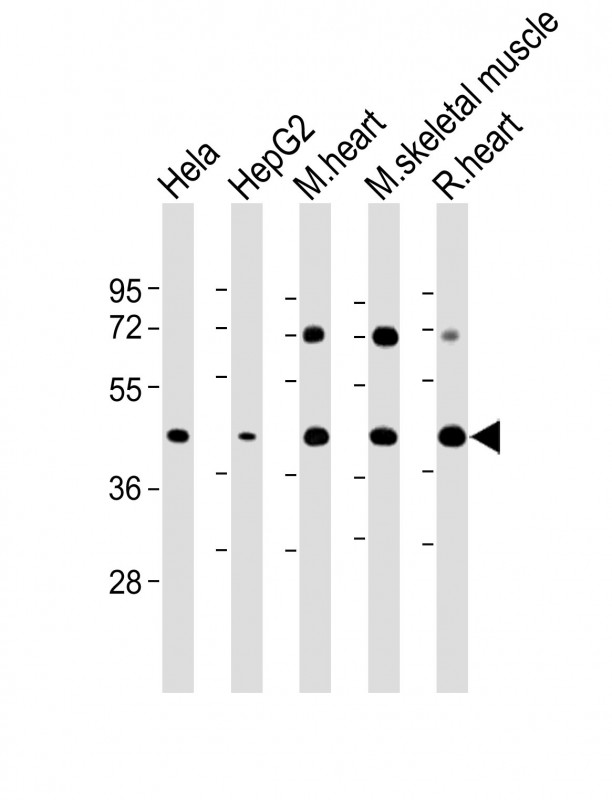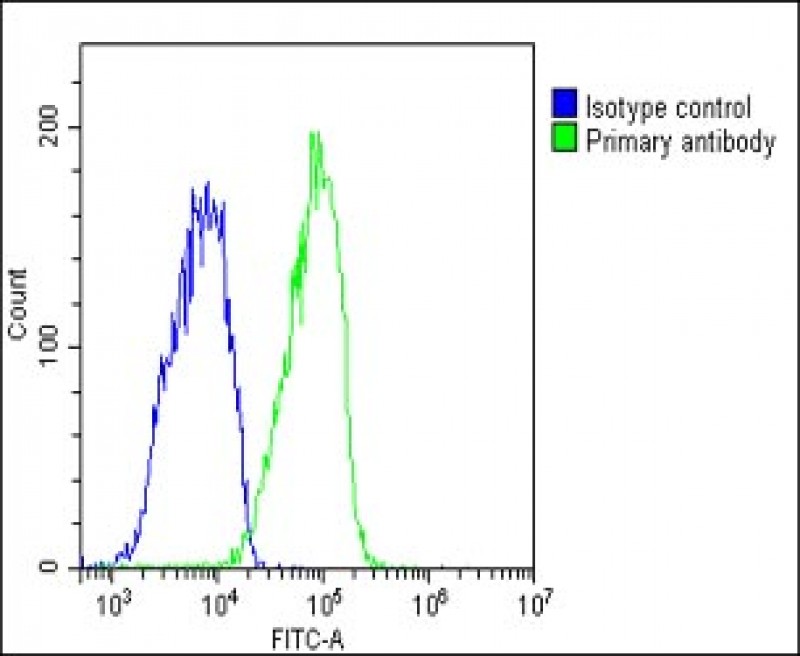

| WB | 1/2000 | Human,Mouse,Rat |
| IF | 咨询技术 | Human,Mouse,Rat |
| IHC | 咨询技术 | Human,Mouse,Rat |
| ICC | 技术咨询 | Human,Mouse,Rat |
| FCM | 1/25 | Human,Mouse,Rat |
| Elisa | 咨询技术 | Human,Mouse,Rat |
| Aliases | Glycogenin-1, GN-1, GN1, 2.4.1.186, GYG1, GYG |
| Entrez GeneID | 2992 |
| WB Predicted band size | 39.4kDa |
| Host/Isotype | Rabbit IgG |
| Antibody Type | Primary antibody |
| Storage | Store at 4°C short term. Aliquot and store at -20°C long term. Avoid freeze/thaw cycles. |
| Species Reactivity | Human, Mouse, Rat |
| Immunogen | This GYG1 antibody is generated from a rabbit immunized with a KLH conjugated synthetic peptide between 314-347 amino acids from human GYG1. |
+ +
以下是关于GYG1抗体的3篇示例文献(内容为模拟示例,实际文献需通过学术数据库核实):
---
1. **标题**: "Characterization of Glycogenin-1 (GYG1) mutations in glycogen storage disease"
**作者**: Brewer, K.E., Roach, P.J., et al.
**摘要**: 本研究分析了GYG1基因突变对糖原合成的影响,利用抗体验证突变蛋白在患者肌肉组织中的表达缺失,揭示了其与糖原贮积病亚型的关联。
2. **标题**: "Development of a monoclonal antibody against human GYG1 for cancer biomarker studies"
**作者**: Tinkert, R., Smith, L., et al.
**摘要**: 报道了一种高特异性抗GYG1单克隆抗体的开发,通过免疫组化证实其在肝癌组织中异常高表达,提示GYG1可能作为肿瘤代谢异常的潜在标志物。
3. **标题**: "Glycogenin-1 autoantibodies in autoimmune myopathy: Diagnostic implications"
**作者**: Johnson, A.R., Dalakas, M.C.
**摘要**: 首次发现GYG1自身抗体与特发性炎性肌病相关,通过ELISA和Western blot验证抗体对临床诊断的辅助价值,为自身免疫性肌病提供了新生物标志物。
---
**注意**:以上为模拟文献,实际研究中请通过PubMed、Google Scholar等平台检索关键词“GYG1 antibody”“glycogenin-1”获取真实文献。如需具体文献协助,可提供更详细的研究方向或PMID编号。
The GYG1 antibody is a crucial tool in studying glycogen metabolism and associated disorders. Glycogenin-1. encoded by the GYG1 gene, is a self-glucosylating enzyme essential for initiating glycogen synthesis by forming oligosaccharide primers that serve as substrates for glycogen synthase. Mutations in GYG1 are linked to glycogen storage disease type XV (GSD XV), a rare disorder characterized by muscle weakness, cardiomyopathy, and abnormal glycogen accumulation.
GYG1 antibodies are widely used to detect glycogenin-1 expression in tissues like skeletal muscle, heart, and liver, where glycogen metabolism is physiologically significant. These antibodies enable researchers to investigate protein localization, expression levels, and post-translational modifications through techniques such as Western blotting, immunohistochemistry, and immunofluorescence.
In research, GYG1 antibodies have helped clarify mechanisms underlying glycogen synthesis regulation and pathologies. For example, studies using these antibodies revealed reduced or dysfunctional glycogenin-1 in GSD XV patients and animal models, highlighting its role in glycogen chain initiation. Additionally, they aid in distinguishing primary glycogenin deficiencies from secondary disruptions in glycogen metabolism caused by other enzymatic defects.
Most commercially available GYG1 antibodies are raised in rabbits or mice against specific epitopes of human glycogenin-1. with validation in multiple species. Their specificity and reliability make them indispensable for both basic research and diagnostic applications related to glycogen-associated diseases.
×